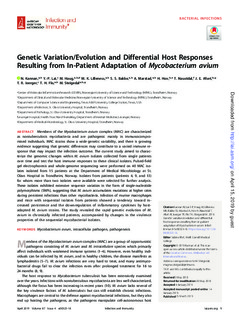| dc.contributor.author | Kannan, Nisha | |
| dc.contributor.author | Lai, Yi-Pin | |
| dc.contributor.author | Haug, Markus | |
| dc.contributor.author | Lilleness, M.K. | |
| dc.contributor.author | Bakke, Siril Skaret | |
| dc.contributor.author | Marstad, Anne | |
| dc.contributor.author | Hov, Håkon | |
| dc.contributor.author | Naustdal, Thor | |
| dc.contributor.author | Afset, Jan Egil | |
| dc.contributor.author | Ioerger, Thomas R. | |
| dc.contributor.author | Flo, Trude Helen | |
| dc.contributor.author | Steigedal, Magnus | |
| dc.date.accessioned | 2019-04-23T07:46:32Z | |
| dc.date.available | 2019-04-23T07:46:32Z | |
| dc.date.created | 2019-04-03T13:32:48Z | |
| dc.date.issued | 2019 | |
| dc.identifier.issn | 0019-9567 | |
| dc.identifier.uri | http://hdl.handle.net/11250/2594964 | |
| dc.description.abstract | Members of the Mycobacterium avium complex (MAC) are characterized as nontuberculosis mycobacteria and are pathogenic mainly in immunocompromised individuals. MAC strains show a wide genetic variability, and there is growing evidence suggesting that genetic differences may contribute to a varied immune response that may impact the infection outcome. The current study aimed to characterize the genomic changes within M. avium isolates collected from single patients over time and test the host immune responses to these clinical isolates. Pulsed-field gel electrophoresis and whole-genome sequencing were performed on 40 MAC isolates isolated from 15 patients at the Department of Medical Microbiology at St. Olavs Hospital in Trondheim, Norway. Isolates from patients (patients 4, 9, and 13) for whom more than two isolates were available were selected for further analysis. These isolates exhibited extensive sequence variation in the form of single-nucleotide polymorphisms (SNPs), suggesting that M. avium accumulates mutations at higher rates during persistent infections than other mycobacteria. Infection of murine macrophages and mice with sequential isolates from patients showed a tendency toward increased persistence and the downregulation of inflammatory cytokines by host-adapted M. avium strains. The study revealed the rapid genetic evolution of M. avium in chronically infected patients, accompanied by changes in the virulence properties of the sequential mycobacterial isolates. | nb_NO |
| dc.language.iso | eng | nb_NO |
| dc.publisher | American Society for Microbiology | nb_NO |
| dc.rights | Navngivelse 4.0 Internasjonal | * |
| dc.rights.uri | http://creativecommons.org/licenses/by/4.0/deed.no | * |
| dc.title | Genetic Variation/Evolution and Differential Host Responses Resulting from In-Patient Adaptation of Mycobacterium avium | nb_NO |
| dc.type | Journal article | nb_NO |
| dc.type | Peer reviewed | nb_NO |
| dc.description.version | publishedVersion | nb_NO |
| dc.source.volume | 87 | nb_NO |
| dc.source.journal | Infection and Immunity | nb_NO |
| dc.source.issue | 4 | nb_NO |
| dc.identifier.doi | 10.1128/IAI.00323-18 | |
| dc.identifier.cristin | 1689990 | |
| dc.relation.project | Norges forskningsråd: 223255 | nb_NO |
| dc.relation.project | Norges forskningsråd: 246944 | nb_NO |
| dc.relation.project | Norges forskningsråd: 220836 | nb_NO |
| dc.description.localcode | Copyright © 2019 Kannan et al. This is an open access article distributed under the terms of the Creative Commons CC BY license, which permits unrestricted use, distribution, and reproduction in any medium, provided the original work is properly cited. | nb_NO |
| cristin.unitcode | 194,65,15,0 | |
| cristin.unitcode | 194,65,1,0 | |
| cristin.unitname | Institutt for klinisk og molekylær medisin | |
| cristin.unitname | MH fakultetsadministrasjon | |
| cristin.ispublished | true | |
| cristin.fulltext | preprint | |
| cristin.qualitycode | 1 | |

